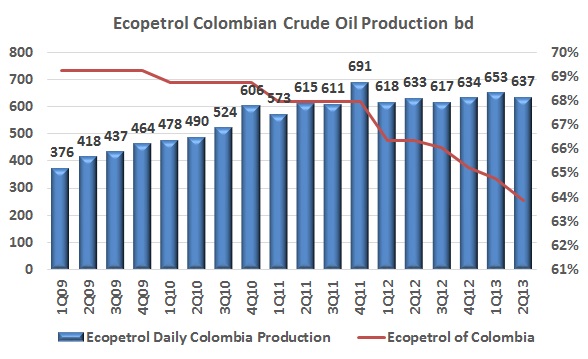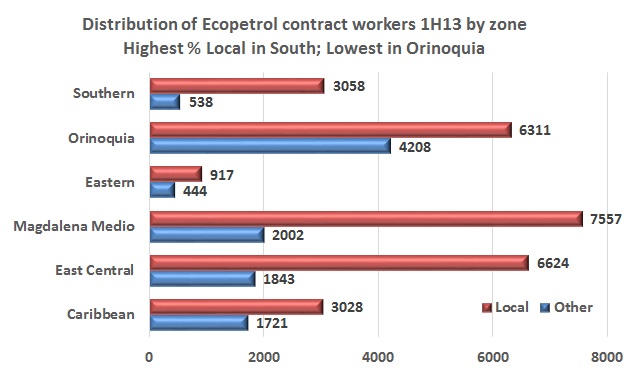In order to finance infrastructure investments in roads, bridges, airports and other items holding back Colombia’s development Ecopetrol should sell an additional 10% of its shares to private investors, says the president of Colombia’s National Association of Financial Institutions (ANIF).

Heavy crude production increased, but lower prices and higher costs from its spinoff of transportation services cut into Ecopetrol’s profits in the second quarter of 2013 although it held production to last year’s level, growing 2.1%.
Venezuela’s need for gas may prompt its NOC PDVSA to attempt to extend the contract it has with Ecopetrol past its current expiration date of 2014. How Colombia’s supply or problems in payments for the gas could change as a consequence still remains a question.

Ecopetrol says that in the first half of 2013 more than 37,000 people worked on job sites and projects of the NOC each month through associated contractors. While they didn’t provide any comparison figures, the company did say local labor was used to fill 72% of these positions.
Ecopetrol will hold environmental workshops with communities that fall in the area of influence of the ODISEA 3D seismic exploration project and the company insists that there are no environmental consequences as a result of the exploration.
Ecopetrol released purchasing figures which show that just over 90% of its purchasing for goods and services in the first half of 2013 (January –June 2013) were with Colombian companies. Moreover, its hiring of local suppliers grew 46% compared to the previous year, according to information from the Ministry of Mines and Energy (MinMinas).
The Colombian government has approved an Ecopetrol bond issue of up to COL3T (US$1.556B), a move analysts say will bolster the dollar against the Colombian peso.
Ecopetrol, through its subsidiary Bioenergy, has land holdings that exceed the legal limits established by Colombian law.
Ecopetrol’s Coveñas terminal is the first among members of the Regional Association of Petroleum, Gas and Biofuel Companies in Latin America and the Caribbean (Arpel) to receive a cross check audit as part of an integration process.
Colombian paint specialist Pintuco has reached an agreement with Ecopetrol to commercialize the later’s MCO-R paint technology in the domestic market as part of a technology transfer and innovation program run by the state oil firm.